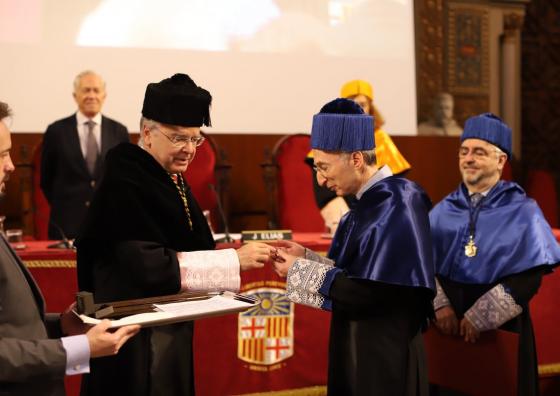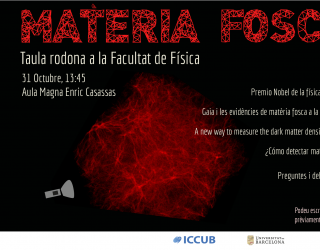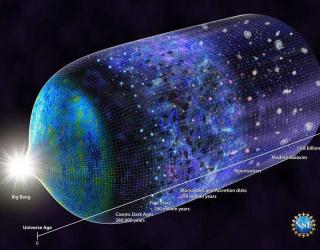Astrophysicist Saul Perlmutter, who led the discovery of the accelerated expansion of the Universe in the nineties and received the Nobel Prize in Physics in 2011, was awarded an honorary doctorate by the UB in a ceremony presided by the rector, Joan Elias, together with his patrons, professors Ramon Canal, from the Department of Quantum Physics and Astrophysics, and Pilar Ruiz Lapuente, member of the Institute of Cosmos Sciences of the UB (ICCUB, UB-IEEC), and the dean of the Faculty of PHyics, Atilà Herms.
After the investiture ceremony Saul Perlmutter gave a lecture on dark energy and the expansion of the universe in physics faculty of the UB. The video of the talk is available on the Youtube channel of the ICCUB
Perlmutter explained, in a didactic way, how his group saw the study of faraway supernovas could be the key to study the expansion of the universe. “The idea that the Universe is expanding should trouble you, because the Universe is everything”, he said, while addressing to the audience, mainly lecturers and students.
The objective of his team was to measure the expansion of the Universe and determine how this process should be. “The redshift of the supernova tells us how the Universe has stretched since it exploded”, said Perlmutter, who highlighted that this milestone was not easy to reach, “because they only explode a few times per millennium”.
Like Ramon Canal said in his speech, Perlmutter “created a new method to find supernovas”, by comparing images of the same stellar field in different moments. The need to combine observations with different telescopes is what brought him to create the Supernova Cosmology Project (SCP).
Ten years after starting this project, the first responses came up and they determined the Universe was expanding quickly. Research also brought another finding: dark energy. “We say ‘dark’ meaning we don’t know what it is”, noted Perlmutter. Regarding this topic, there have been many theories and articles published: “Many talk about dark energy, but no one has found out what it is yet”, he said.
According to Ramon Canal, the discovery of the accelerated expansion of the Universe has changed “not only our understanding of cosmology, but also the basis of physics”. Pilar Ruiz Lapuente, ICCUB and SCP member, remembered the “extraordinary experience” of those who took part in that moment. SCP, under the supervision of Perlmutter, has grown and “Saul’s human qualities served to keep the group together”, highlighted the professor.
Science as a tool for critical thinking
To answer all of these doubts, Perlmutter defended a “slow project” that needs new techniques, instruments and background work to make it possible. Therefore, he noted we need to be patient: “It is worth spending ten or twenty years on these projects. Society needs to understand that it takes time, nothing gets done instantly”.
However, the encouraged the students to be a part of this process because “now it’s the perfect time”, regarding the new projects on the telescopes they are working on (WFIRST and EUCLID) and which will open a new era in cosmology. “Now is an exciting moment for cosmology”, which he defined as a young discipline. “We are now ready to get the following degree of precision data”, he noted.
Perlmutter finished his speech sharing his thoughts on science: “Science is more social than what we think. It’s about working together. It’s not about fighting on who is right, but about collaborating to solve problems”. In this sense, he also said that “science is being open to being wrong” and that in order to solve complex problems, “everyone needs to add ideas”. “Science can provide tools to promote critical thinking”, he concluded.
Images of the ceremony are available in the UB Flikr








